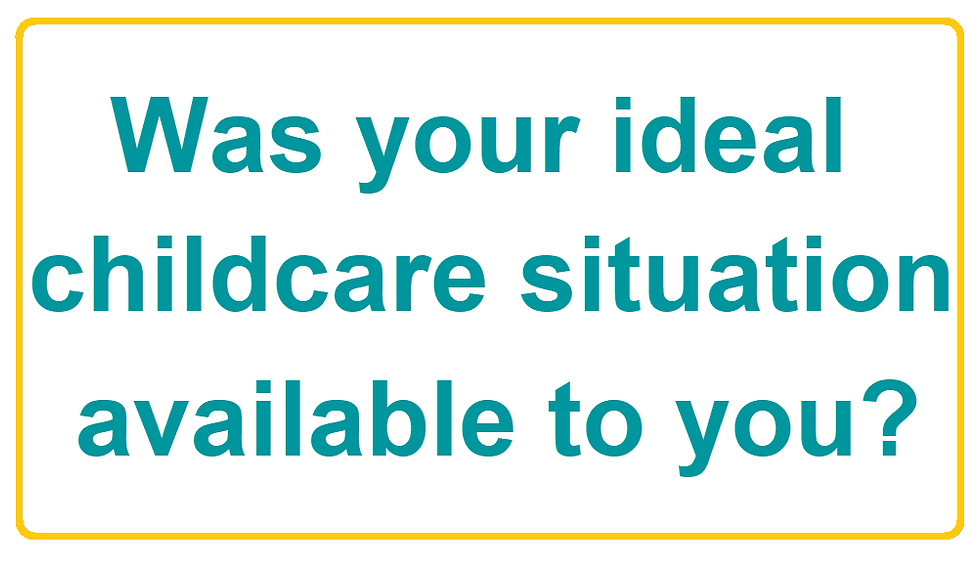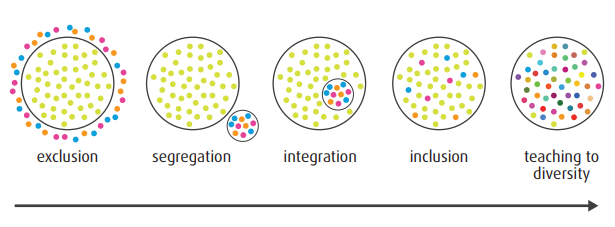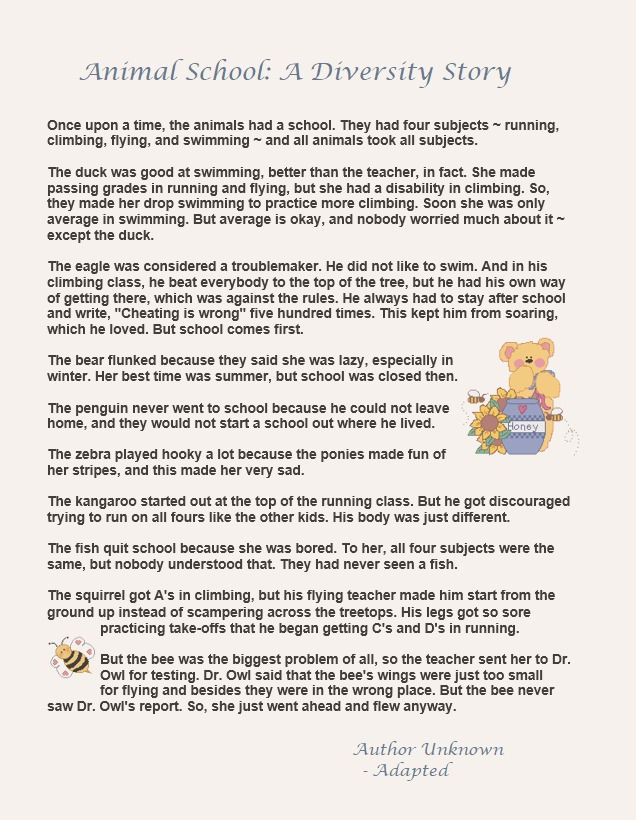Inclusion: One Size Does Not Fit All
- Heidi Reeves

- Aug 12, 2020
- 10 min read
Updated: Feb 3, 2024

If you happen to be speaking with an inclusion advocate, you’ll probably hear them say something like this,
"Let’s stop excluding children with diverse needs from typical childcare. We need a revolution now! We need to raise awareness, and educate the educators, and make sure all childcare settings are inclusive, and strive for inclusion everywhere because inclusion is nice and inclusive.”
That’s all well and good, and a terrific goal, but right now it is not realistic to make childcare centres be inclusive. Forcing the issue just might be damaging.
In Canada, some provinces want all childcare facilities to have an Inclusiveness Policy. That insinuates that all centres should be inclusive.
I think that is a big mistake.
Choice
A long time ago, when I was taking Early Childhood Education in college, we were taught that all children are to be accepted into all programs on a first come first serve basis. Anti-bias. No choosies.
Over the years, I learned it is wiser to be a bit choosy. I am referring to ALL families, not to families of children with diverse needs. Not all families or children fit into all settings. Families new to choosing childcare can’t always see why they might not be a good fit for a program. Or they may overlook something, even red flags, because they are desperate for a childcare spot. So it may fall to the director to let them down. There are a hundred reasons why a family and a program might not be a good fit for each other. Sometimes the family sees it. Sometimes the director does. Here are a few examples:
A family only wants certain part-time days or hours, or asks for extended hours.
Clashing beliefs about early education, discipline, childhood, certain policies, etc.
Personality conflicts with staff that can be anticipated. So the family or staff just know the family would be happier at another centre.
The child would not feel comfortable or may not have any potential friend in the current group of children. For example, a quiet, shy, young 35 month-old child might feel anxious or lonely in a whole group full of 4.5 year-old, boisterous, rough-and-tumble children, or vice versa.
Not all childcare programs or caregivers are created equally. Program quality certainly varies. Environments vary. The amenities and supplies vary. Staff knowledge, skills, attitudes and abilities vary considerably. Employee satisfaction and turnover rates vary.
A family may have a child whose particular needs cannot or will not be met, either by the environment or by the caregivers, for a variety of reasons.
No, not every childcare setting is good for every family.
Additionally, consider the idea that every single childcare centre should bend over backwards to make everything work for everybody. Should they?
Sometimes they shouldn’t. Sometimes they should. Sometimes they can’t. Sometimes they won’t. Sometimes, just plainly, another place would be 1000 times better for a particular family for any number of reasons. Not all bad reasons.
I bring that up because there are a thousand styles and types of childcare settings run by even more people for a reason: Because there are just as many different types of people who would be interested in each of them.
People need choices. Looking at the school system as an example, consider how some teachers and families are stuck miserably with each other all year. They could use choice.
Look at the positives within the school system: the majority of schools may be regular public schools, but there are also schools within the public school system with many different focuses (Montessori, Traditional, Waldorf, “Alternative”, etc), and all sorts of private schools (religious, gifted, outdoors, dance, music, etc.) Maybe not so many in Prince George, but certainly in other places.
On top of that, there are homeschoolers, un-schoolers, online schools, and all combinations of everything. Choice is good.

But where is the choice when you can’t afford it, or there are just not enough spaces available, or your ideal childcare situation just doesn't exist?
Families should have access to the Early Care and Education that is best for their child and family, not be stuck with the most affordable and widely available.
Funding, Support and Attitudes
I do not believe that inclusion works in the majority of childcare at this time. There is not enough funding, not enough teacher training, not enough support workers, not enough doctors and therapists to diagnose children so they can access support or funding quickly, not enough different types of childcare, and certainly there are still not enough educators who are actually interested in making inclusive practices work at their facility.
When teachers who are frustrated with not having enough supports, or who have the wrong attitude, or have no desire to be inclusive are made to work in "Zero Reject" inclusive environments, both the children with typical and diverse needs pick up on the negativity.
At best it could be an uncomfortable environment, and at worst it could be very damaging for the children.

Trauma
In all of these forced, so-called inclusive environments (actually, they are mostly “integrated” and “mainstreamed,” but not “inclusive” by definition), children with diverse needs experience trauma on top of trauma, year after year, as a result of being expected to fit in; teachers being impatient due to factors such as not enough support, funding, education, or inclination; other children picking on them; and being taught to act or be “normal” either directly or indirectly when it is so, so hard.
The message to the children is that they are not good enough as they are.
A simple fact that some people forget is that these children not only have diverse needs, but they are children. People. All people are different.
All people are also the same. Everybody has their individual temperaments and preferences. All people need options. Good options.
Families not only need childcare options, they need high quality childcare options. Children deserve environments that support them to stretch and grow fully into themselves as confident, capable people. Children deserve respect. These are their rights under the United Nations Declaration of the Rights of Children.

Quality and Inclusion
Here's some reality. What if some children and families do not even want to be in an inclusive classroom?
Some families are forced to homeschool their children because there are no:
Specialized, modern, high-quality, research and evidence-based special needs childcare or schools.
Reverse-inclusion childcare/schools where there are equal or more children with diverse needs than there are typical kids.
Small groups with high teacher-student ratios, like 1 educator to 4 children.
FYI Group care for under 3 years has 1 educator to 4 children. Group 3-5 yr old care has 1 to 8. Then Family daycare and Multi-age care, have ratios of 1 caregiver to 7 children, and 1 educator to 8 children, respectively.
Or other types of specialized settings that families might find preferable to regular inclusive childcare or schools.
Statistics show that at least half of all childcare in Canada offers mediocre care or worse. Typically developing children should not be in that type of care. A child with more needs definitely shouldn’t be there. I believe it would be unethical to put children with diverse needs into settings that are not ready to offer excellent care and education to them and to all children.
New research is always changing ideas of what is right. What seems like excellent practice now, may not seem like excellent practice in 15 years. I look back at the way inclusion ideology has progressed over the decades: from separate schools, to integration and mainstreaming, to inclusion… Ideology IS going to change again. Inclusion is just a step. It might even come full circle because society is crazy like that. But I have a bigger idea of where we are going with it.
Background: Group Size
The idea of the care and education of large groups of children as we know it came about 100-150 years ago. The powers of the time wanted to teach everyone English, compliance, assimilation, morality, and conformity.
The world has changed since then. Children have changed. Research is evolving. Many mainstream and traditional Early Childhood and elementary classrooms are not even good for typical children, or the varieties of temperaments, personalities and learning styles that children bring to them.

I do not believe large groups of children are natural or healthy for care or learning; not in early childhood and not in public primary grades. As it is now, group childcare, in fact all types of childcare, are regulated to allow too many children per class and per teacher due to lack of money, and the need to maximize the number of children in order to be able to cover expenditures including staff wages. Parents could not afford the fees that would occur with smaller ratios of children to Early Childhood teachers.
Background: Quality, Brain Development and the Government
Parents cannot afford the high costs of childcare. Thankfully, the government is attempting to help. Their solution is Universal Childcare. As Universal Childcare is brought in by the provincial (and federal) government, it is unlikely that there will be a change for the better in the classrooms for the children, and possibly the staff.
This is because governments are run by bean-counters who don’t understand what high-quality, early care and education programs actually cost. They don’t understand the gravity of limiting funding for Early Childhood programs and wages. Lower quality programs can have profound effects on brain development and the foundation of people’s lives.
The bean counters don’t understand why Early Childhood Educators would need to offer various specialized types of programs, or everything that running specialized programs entails. They don’t understand these effects on children with diverse needs. (Exhibit A: Public schools, teacher strikes, overfilled classrooms, old textbooks, cut programs, cut Educational Assistants for the children with diverse needs, governments coming in and changing everything, unions fighting back. Messy.)
With Universal Childcare, child advocates, parents, and Early Childhood Educators will need to fight to keep the governments accountable and investing enough to keep the quality of childcare high. The brain growth, emotional regulation, social skills, personality shaping, and attachment that happens before the age of 6 years have profound repercussions for academic success, adult health and quality of life, income level, and even the chance of jail time.

All of these can positively or negatively affect the government’s interests in society and taxes. Therefore, if the government cannot have compassion for individual children’s lives, they should be interested in the future economy and the dividends the investment in Early Childhood will pay.
The Future
In addition to forced inclusion, limited choices, and issues with government funding, another problem I see with today’s “inclusion” is that a lot of neurotypical and able-bodied adults (aka regular adults: parents, teachers and policy makers) deciding what is right for a large segment of children with needs as varied as snowflakes.
The underlying assumption that I can see coming through is that in order for a child to live a full life they must be "normal like everyone else." So, put all the children with diverse needs into all the "normal" environments with all the rest of the "normal" children.
Just tweak things here and there to make everything relatively accessible to all the children. Then all the children will be happy and fulfilled. Right?
Hmmmm.

So, what if we throw out the idea that children with diverse needs should be included with the rest of the children?
What if the rest of the children are included in a special needs school?
Or consider this.
What if Diverse Needs people ruled the world? Everything was accessible, things that cause sensory disturbances were all pared down, and the world just ticked along, business as usual, in a 100% Diverse Needs way.
But then what if Typical people were the minority, and they had to fit into a Diverse Needs world instead of the other way around? What if the Diverse People had to make "inclusive" accommodations for the minority of "fast-moving, loud, Typical people" and their “annoying” Typical children? I hope you can see the ways that thinking is flawed.
If you are an Able-bodied, Neurotypical person, you wouldn't want all the Diverse people to just allow you because they had to, would you? ("Well, this is supposed to be an inclusive place, so we have to let you in.")
Wouldn't you want options that work for you, and not just what Diverse people thought you should have? Maybe you would want to be just be thought of as a person with the same rights as everyone else. Maybe you would want the world to be designed for all people, not just the Diverse people. Plus, you could want to have options as an individual. Maybe you would even like the option to take classes full of other fast, loud people like you.
The idea of “including” people sounds able-ist. It needs a new title and a new motivation.
Or none, and people are all accepted as people. And the choices will just be there. Accommodations would not be called accommodations because they would be the norm.
So if it's not called "Inclusive Childcare" then what?
Perhaps "Care and Education for Human Diversity."
Or just "Care and Education for Children."
Period.
I think this type of change is coming.
I believe that what will eventually be accepted is that different situations work for different people.
Wow. Mind-blowing.
So simple.
Boom
There will be different types of childcare and education for every child’s needs and every family.
We will create centres built for all children's needs.
We will create centres that are specific special needs settings.
We will even create centres that offer reverse inclusion.
Then we will make each of those available in small groupings (because they are best), alternative times or days, different childcare approaches, and a flexible mixture of modes, models and locations.
Plus, we will do all of that while offering program choices such as Forest, Waldorf, Reggio Emilia, Montessori, Head Start, Indigenous Education, Fine Arts, Performing Arts, Specialty and Religious.
(Yes, that’s a lot. I’m an idealist. Maybe a dreamer, too.)

To avoid the problem of educators having poor training and negative attitudes, they should have to take a diversity class to build their understanding and compassion for Children with Special Needs before they can even become certified educators. Before graduating, Early childhood Educators could be approved Diversity Advocates after receiving all the training and personal experience necessary to fully develop their understanding of teaching to diversity in classrooms, and exhibit an understanding and appreciation of Human Diversity of all kinds.
The current trend in teaching “inclusive practices” is far too limited. We need to take off our blinders and think outside the box.
Include? No. Think about what that word implies. It is a verb. It takes effort. Without "doing" it, it doesn't happen. People may "do" it grudgingly. There is no implication of a change in thought. It's like an order a parent gives their child, "Include your sister!"
Contrast that with the term Human Diversity. It is a noun. It is a fact. It is knowledge. It is positive. Diversity is a strength.

It is crucial to ensure that the people contributing to policy and research represent human diversity.
We need to stop limiting children, families and ourselves.
We are Diverse.
We should embrace diversity, not inclusion.
We also should offer diverse options for diverse people instead of squishing everyone into inclusion.
I do not have all the answers right now. But I know this...
Inclusion: One size never fits all.
Written by Heidi Reeves




Comments